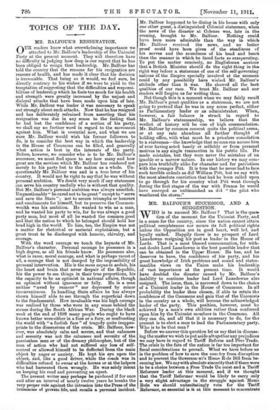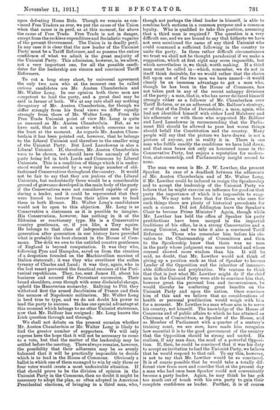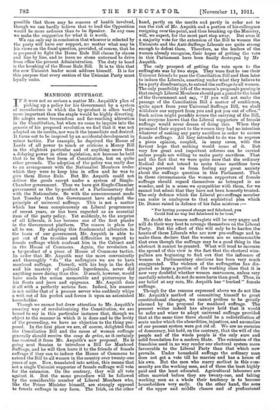MR. BALFOUR'S SUCCESSOR, AND A SUGGESTION.
WHO is to succeed Mr. Balfour ? That is the ques. tion of the moment for the Unionist Party, and in a sense for the country, since the nation cannot attain political completeness nor secure its full political rights unless the Opposition are in good heart, well led, and loyally united. Happily there is no prospect of Lord Lansdowne resigning his post as leader in the House of Lords. That is a most blessed consummation, for with- out doubt Lord Lansdowne is the best possible leader that can be obtained in the Upper House. He has, and he deserves to have, the confidence of his party, and his great knowledge of Irish problems and sound and states- manlike views on the Union make his leadership of vast importance at the present time. It would. have doubled the disaster caused by Mr. Balfour's inability to continue leader had Lord Lansdowne also resigned. The issue, then, is narrowed down to the choice of a, Unionist leader in the House of Commons. In all probability the leader thus chosen, if able to retain tha confidence of the Commons and gain that of the Unionists in the country as a whole, will become the acknowledged leader of the party. This position, however, must be achieved by a man's own abilities rather than conferred upon him by the Unionist members in the Commons. All they can do, and all that it is necessary to do, for tha present. is to elect a, man to lead the Parliamentary party. Who is to be that man ?
Before we answer this question let us say that in discuss- ing the matter we wish to put aside altogether any prejudices we may have in regard to Tariff Reform and Free Trade. The crisis in the fate of the nation is far too important for fiscal considerations to prevail. What we have before us is the problem of how to save the couLtry from disruption and to prevent the Government's Home Rile Bill from be- coming law. We say with absolute sincerity that if there were to be a choice between a Free Trade Un onist and a Tariff Reformer leader at this moment, and if we thought that the Tariff Reformer -would be likely to carry only a. very slight advantage in the struggle against Home Rule we should unhesitatingly vote for the Tariff Reformer, so essential is it at this moment to concentrate upon defeating Home Rule. Though we remain as con- vinced Free Traders as ever, we put the cause of the Union when that cause is in peril, as at this moment, far above the cause of Free Trade. Free Trade is not in danger, except from the-reckless expenditure and Socialistic vagaries of the present Government. The Union is in deadly peril. In any case it is clear that the new leader of the Unionist Party must be a Tariff Reformer, and so possess the entire confidence of what we admit is the great majority of the Unionist Party. This admission, however, is, we allow, not a very important one, for all the possible candi- dates for the leadership are sincere and convinced Tariff Reformers.
To cut a long story short, by universal agreement the only two men who at the moment can be called serious candidates are Mr. Austen Chamberlain and Mr. Walter Long. In our opinion both these men are competent to lead the party, and a great deal may be said in favour of both. We at any rate shall say nothing derogatory of Mr. Austen Chamberlain, for though we differ strongly from his fiscal views we differ equally strongly from those of Mr. Walter Long. From the Free Trade Unionist point of view Mr. Long is quite as unsound as Mr. Austen Chamberlain. But, as we have said, that is not a matter which concerns us in the least at the moment. As regards Mr. Austen Cham- berlain it has been pointed out, however, that he belongs to the Liberal Unionist and therefore to the smaller wing of the Unionist Party. But Lord Lansdowne is also a Liberal Unionist. If, therefore, Mr. Austen Chamberlain were to be chosen, we should have the anomaly of the party being led in both Lords and Commons by Liberal Unionists. This is a condition of things which it is under- stood would be resented by a very large number of old- fashioned Conservatives throughout the country. It would not be fair to say that they are jealous of the Liberal Unionists, but undoubtedly there would be a considerable ground of grievance developed in the main body of the party if the Conservatives were not considered capable of pro- ducinn•° a leader, and it could be represented that they were forced to borrow from their allies men to lead them in both Houses. Mr. Walter Long's candidature would not be open to this objection. Mr. Long is as Conservative a statesman as it is possible to imagine. His Conservatism, however, has nothing in it of the Eldonian or reactionary type. He is a Conservative country gentleman, or, if you like, a Tory squire. He belongs to that class of independent men who for generation after generation in our history have provided what is probably the best element in the House of Com- mons. The debt we owe to the untitled country gentlemen of England is beyond computation. It was they who, following Pyre and Hampden, saved us from the creation of a despotism founded on the Machiavellian maxims of Italian statecraft ; it was they who overthrew the sullen tyranny of Charles and Laud ; it was they, again, who in the last resort prevented the fanatical excesses of the Puri- tanical republicans. They, too, sent James II. about his business and secured the Protestant succession. Their broad shoulders, even though with some disdainful shrugs, upheld the Hanoverian monarchy. Rallying to Pitt they withstood first the armed Jacobinism of France and then the menace of Napoleonic militarism. Mr. Walter Long is bred true to type, and we do not doubt his power to lead the party to success. He has one special advantage at this moment which belongs to no other Unionist statesman, now that Mr. Balfour has resigned : Mr. Long knows the Irish question through and through.
We shall not debate on the present occasion whether Mr. Austen Chamberlain or Mr. Walter Long is likely to find the greater number of supporters. We will only express here the hope that it will not be necessary to come to a vote, but that the matter of the leadership may be settled before the meeting. There always remains, however, the possibility that their adherents may be so evenly balanced that it will be practically impossible to decide which is to lead in the House of Commons. Obviously a ballot in which one of them managed to win by only three or s' four votes would create a most undesirable situation. If that should prove to be the division of opinion in the Unionist Party in the Commons, then no doubt it might be necessary to adopt the plan, so often adopted in American Presidential elections, of bringing in a third man, who, though not perhaps the ideal leader in himself, is able to combine both sections in a common purpose and a, common loyalty. Who is qualified to take this position, assuming that a third man is required ? The question is a very difficult one, and we are bound to say that hitherto we have not seen mentioned the name of any third Unionist who could command a sufficient following in the country to unite the party. In these rather difficult circumstances we trust we shall not be thought paradoxical if we make a suggestion, which at first sight may seem impossible, but which nevertheless is, we think, worth making. If a third man must be called in—which, remember, we do not in itself think desirable, for we would rather that the choice fell upon one of the two men we have named—it would clearly be an immense advantage to get a man who, though he has been in the House of Commons, has not taken part in any of the recent unhappy divisions of the party ; a, man, that is, who has never declared himself strongly either as a follower of Mr. Chamberlain over Tariff Reform, or as an adherent of Mr. Balfour's strategy, or of that of the Duke of Devonshire ; a man, again, who had not identified himself with either Lord Halsbury and his adherents or with those who supported Mr. Balfour and Lord Lansdowne in recommending that the Parlia- ment Bill should be allowed to pass lest worse things should befall the Constitution and the country. Many people will say that the picture we have drawn is not a picture of anyone, yet in reality it is. There is one man who fulfils exactly the conditions we have laid down, and that man bears not only an honoured name in the Conservative Party, but enjoys a reputation for modera- tion, statesmanship, and Parliamentary insight second to none.
The man we mean is Mr. J. W. Lowther, the present Speaker. In case of a deadlock between the adherents of Mr. Austen Chamberlain and of Mr. Walter Long, if Mr. Lowther could be induced to resign the Speakership and to accept the leadership of the Unionist Party we believe that he might exercise an influence for good on that party the importance of which it is impossible to exag- gerate. We may note here that for those who care for such things there are plenty of historical precedents for such a course. Did not Addington leave the Speaker's Chair to become Prime Minister ? Again, though while Mr. Lowther has held the office of Speaker his party predilections have been merged in the impartial traditions of his office, he is a, strong Conservative and a, strong Unionist, and we take it also a convinced Tariff Reformer. Those who remember him before his ele- vation to the Chairmanship of Committees and then to the Speakership know that there was no man in the party whose judgment was more trusted and whose counsel showed more wisdom than his. It will be said, no doubt, that Mr. Lowther would not think of giving up a position such as that of Speaker to become' Leader of the Opposition and the inheritor of innumer- able difficulties and perplexities. We venture to think that that is just what Mr. Lowther might do if the chief men in the Unionist Party were able to convince him that, however great the personal loss and inconvenience, he would thereby be conferring great benefits on the Unionist Party and upon the nation. Once convince him of this and we believe that no considerations of health or personal predilection would weigh with hi:n for a moment. Mr. Lowther is a man whose aim is to serve his country, not himself. The knowledge of the House of Commons and of public affairs to which he has attained as Chairman of Committees, as Speaker of the House, and as Member of Parliament with a quarter of a century's training must, we are sure, have made him recognize how essential it is to the good government of the country that the Opposition should be strong and united. He realizes, if any man does, the need of a powerful Opposi- tion. If, then, he could be convinced that it was his duty to accept an invitation to lead the Unionist Party, we believe that he would respond to that call. To say this, however, is not to say that Mr. Lowther would be so convinced. It is of course possible that he would take a totally dif- ferent view from ours and consider that at the present day a man who had once been Speaker could not conveniently become a party leader. Again, he may think he has got too much out of touch with his own party to gain their complete confidence as leader. Further, it is of course possible that there may be reasons of health involved, though we can hardly believe that to lead the Opposition would be more arduous than to be Speaker. In any case we make the suggestion for what it is worth.
We can only say in conclusion that whoever is selected by the party will have our support, no matter what may be his views on the fiscal question, provided, of course, that he is prepared to fight the Home Rule Bill clause by clause and line by line, and to leave no stone unturned to drive from office the present Administration. The duty to hand is the breaking of the Home Rule Bill. It is to this that the new Unionist leader must address himself. It is for this purpose that every section of the Unionist Party must loyally unite.




















































 Previous page
Previous page